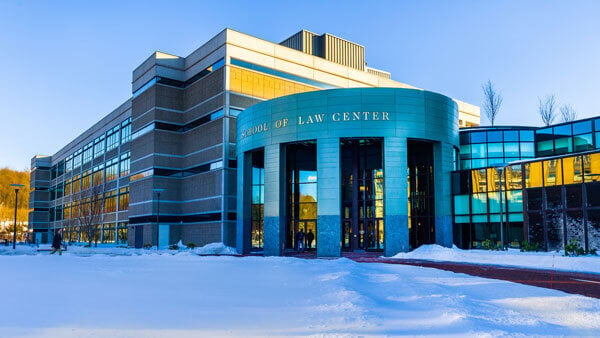
Law students’ proposed anti-trafficking legislation debated at state judiciary public hearing
March 25, 2021

March 25, 2021

The law students lobbied for the expansion of vacatur laws in Connecticut that would allow more victims of human trafficking to request that a court vacate, or set aside, their criminal convictions.
Sheila Hayre, visiting associate professor of law and the Waring and Carmen Partridge Faculty Fellow at Quinnipiac, said that although Connecticut’s vacatur law has been on the books since 2013, it has been used by only a single victim to vacate her prostitution conviction.
“The statute currently allows judges to vacate the convictions of trafficking victims, but only if they have been convicted of prostitution,” Hayre said. “All other victims — even if they can demonstrate that their participation in the crime was a result of having been a victim of trafficking — are ineligible to request vacatur, no matter how compelling their histories of being trafficked. This means that deserving victims cannot even apply for vacatur, because they were never convicted of prostitution.”
Three professors and three law students from Quinnipiac testified, while an additional four students submitted written testimony.
Hayre said traffickers often control their victims by compelling them to engage in illegal activity and then threatening to expose them to criminal prosecution. This helps traffickers avoid criminal liability themselves, while ensuring the continued vulnerability of their victims. When victims try to resist or leave their traffickers, they know their past criminal activities can always be used against them by the trafficker.
“Victims of human trafficking are first and foremost victims,” Hayre said.
“Connecticut should not criminalize trafficking victims. Unfortunately, Connecticut, like other states, currently lacks programs and protocols for identifying trafficking victims who remain hidden as their cases wind through the criminal system. As our state enacts other criminal justice reforms, legislators should, at a minimum, amend Connecticut’s vacatur statute to permit judges to vacate the criminal convictions of trafficking victims, even if they have never been convicted of prostitution.”
In a National Survivor Network survey of 130 trafficking survivors, 60 percent reported being arrested for crimes other than prostitution or drug-related offenses. Such crimes include forgery, larceny, burglary, loitering, vagrancy, disorderly conduct, assault and resisting arrest. As survivors struggle to rebuild their lives, their criminal records severely limit access to employment, housing, education and other building blocks of civic life.
“Giving judges the discretion to consider such cases would expand eligibility for vacatur and offer trafficking survivors an opportunity to rebuild their lives and become productive members of our communities,” Hayre said. “Connecticut’s vacatur law was intended to erase the official stain that haunts trafficking victims even after they have escaped their traffickers — their criminal records. It is time for us to question why only a handful of trafficking victims are currently eligible for vacatur, and to remember why survivors of trafficking deserve a second chance.”
Quinnipiac Today is your source for what's happening throughout #BobcatNation. Sign up for our weekly email newsletter to be among the first to know about news, events and members of our Bobcat family who are making a positive difference in our world.
Sign Up Now